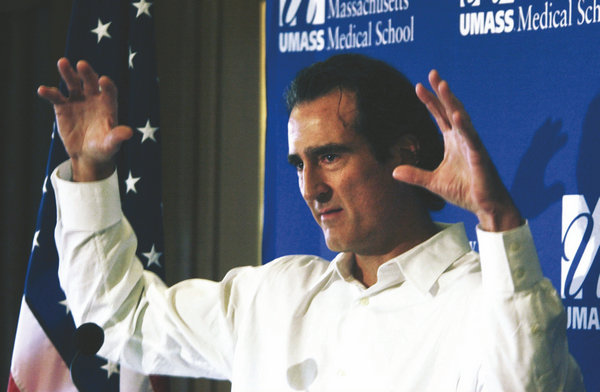
Nobel Prize recipient Craig Mello speaks at a news conference in Boston in 2006. The biologist has worked with Chinese scientists for years.(Photo provided to China Daily)
Craig Mello, an American biologist and co-winner of the Nobel Prize in 2006, says the great thing about science is that it can break barriers and bring people of different cultural backgrounds together.
In his younger days, Mello, now 56, used to interact with many Chinese students and fellow scientists, who then visited the United States for studies or to attend seminars. One such meeting led to his friendship with Zhang Biliang, an entrepreneur who returned to China and founded the Guangzhou-based biotech company RiboBio in 2006.
Mello and Zhang have worked together since.
"Friendship really is the key (to our cooperation), and we've been collaborating closely," Mello tells China Daily during a recent visit to the southern city of Guangzhou in Guangdong province.
The professor of molecular medicine at University of Massachusetts Medical School and a member of the US National Academy of Sciences shares his Nobel Prize with Andrew Fire for their discovery of RNA interference, a genetic process.
It is an example of the RNA-guided searching mechanism that cells develop to find and regulate genetic information, quite analogous to the way we would search the Internet, Mello explains.
RNA interference allows researchers to rapidly "knock out" the expression of specific genes and define the biological functions of those genes. It also provides a potential avenue to "silence" genes that cause or contribute to diseases.
"It has huge ramifications and implications both for medicine and other fields. So it's an extremely exciting time now in genetics," Mello says.
RiboBio has been among China's early companies to develop medicines based on RNA interference.
Led by Mello, who is a scientific consultant and chairman of its scientific and strategic development commission, RiboBio has formed an international research team on RNA-based therapies.
In 2011, the company's focus on RNA silencing and relevant therapies was recognized as an innovative project by the provincial government.
Currently the company is developing RNA treatments for diseases, including liver cancer, based on such technologies. A RiboBio treatment for osteoarthritis that uses RNA technology is expected to go into clinical trials this year.
The company has created the Canton Nucleic Acids Forum, a series of recurring conferences with the initial goal of exposing Chinese scientists to the latest developments in research on nucleic acids worldwide and translating the new knowledge into practical applications everywhere.
During his brief visits to China, Mello holds discussions with the Chinese employees of RiboBio.
"The more different ideas you can bring into a discussion, the more likely you will come up with interesting solutions. That works both for the science and the business side of the company," he says.
Other than the Nobel, Mello's scientific achievements have won him many honors. Now, he holds a number of positions, including as an investigator of the Howard Hughes Medical Institute in the US.
According to Mello, he developed a strong interest in science from looking for dinosaur bones with his father, a paleontologist who frequently took him on fossil-hunting tours.
"I became fascinated pursuing my curiosity about the Earth and its history," he recalls. "When you are a scientist, it becomes your job to keep asking questions your whole life. It does shape your lifestyle."
Recognized for his work in China, Mello was given the 2015 Friendship Award, a top honor for foreigners who have made significant contributions to China's social and economic development.
"I'm honored by the award. I'm very proud to be a friend of China, and hope I can give back to China in the future as our relationship continues to develop," Mello says.
"It's great that China celebrates its friendships that way. The awards bring experts into China to let the country benefit from their wisdom."
Early last year, Mello was invited to a seminar held by the Research Office of the State Council and the top administration for foreign expert affairs to seek feedback from foreigners on the Chinese government's work report.
Mello's advice to Chinese officials was: China should keep its current policy of investing in basic scientific research in areas that aren't ready for commercialization yet.
"It will have the biggest payoff down the road because the new discoveries are totally unanticipated," says Mello, noting the example of his own finding, which was the outcome of experimenting on a worm.
"You wouldn't discover it if you just tried to kill cancer in your laboratory and only worked on sick humans."
In Mello's opinion, China has all the ingredients - brain power and strong government funding for research at a time when budgets in the sector are down in other countries - to play a leading role in world science.
"Now we see many Chinese scientists coming back and succeeding here," Mello says. "I think the stage is really set for China to take a leadership role scientifically."
That's going to be a really good thing in many ways, he says, including healthy rivalry for the US.


















































